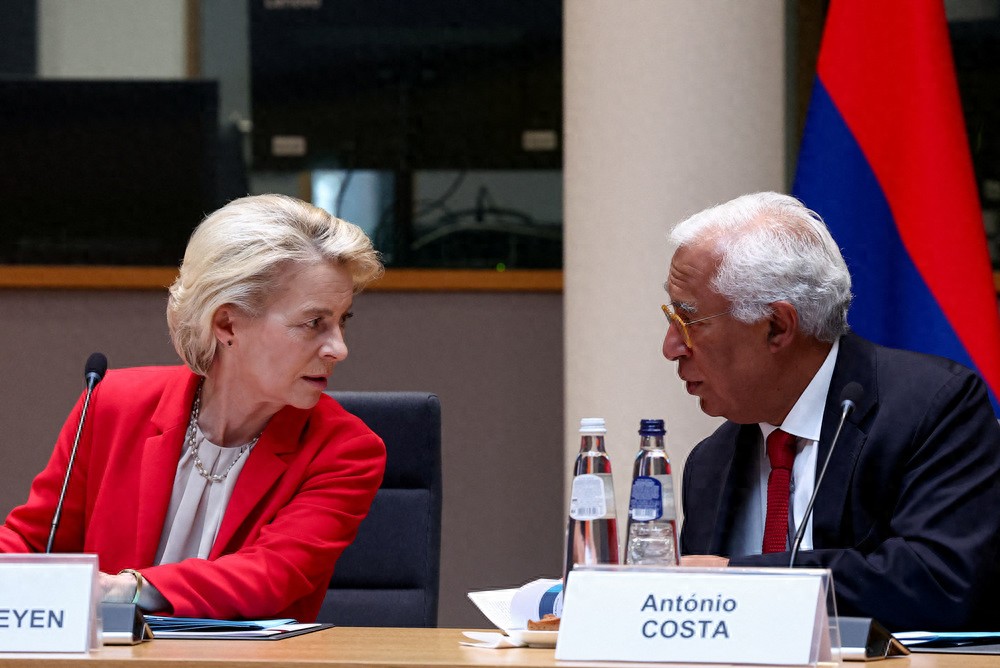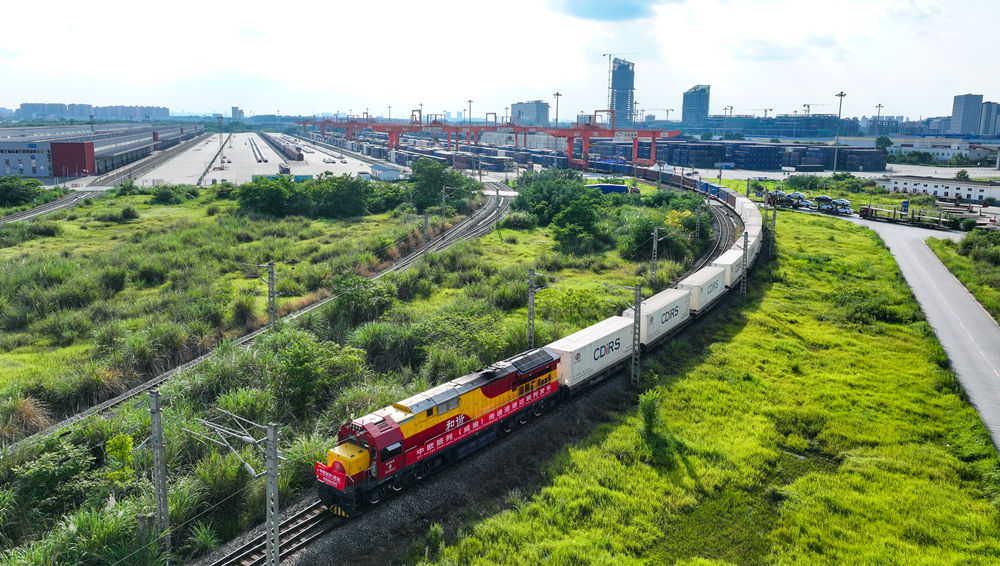【By Observer News, Wang Kaiwen】
According to Xinhua News Agency, on the morning of July 24, President Xi Jinping of China met with European Council President Costa and European Commission President von der Leyen in the Great Hall of the People in Beijing, who came to China for the 25th China-EU Leaders' Meeting (hereinafter referred to as "Sino-European Summit").
This year's Sino-European Summit coincides with the 50th anniversary of the establishment of diplomatic relations between China and the EU. Under the complex and changing international situation, the direction of Sino-European relations has become a focus of attention from the outside world.
Costa said last week that this summit is an opportunity for the EU and China to have open and constructive dialogue on their respective concerns. "We want dialogue, real participation, and concrete progress."
However, in recent periods, the EU has frequently raised disputes with China, rehashing old topics such as China's "overcapacity" and "de-risking" toward China; just before the summit, Chinese enterprises and financial institutions appeared on the EU's 18th list of sanctions against Russia. Some Western media have also been spreading a "tense atmosphere" between China and the EU.
According to Feng Zhongping, Director of the Institute of Europe at the Chinese Academy of Social Sciences, it is necessary to view the Sino-European relationship comprehensively and objectively, avoiding one-sided views that only focus on problems. Although the current Sino-European relationship faces many challenges, there is still great room for cooperation. The fact that EU leaders traveled all the way to China to jointly chair and attend the summit reflects the EU's willingness to engage in dialogue and cooperation with China.

European Commission President von der Leyen (left), European Council President Costa, Oriental Image
"We don't avoid problems, but we can't let the West dominate the narrative"
Jian Junbo, Director of the Center for Sino-European Relations at the School of International Studies, Fudan University, told Observer that releasing "hardline" signals on China-related issues before the summit reflects some strategic considerations of the EU.
Jian Junbo pointed out that the EU hopes that its concerns will receive responses from China and be further discussed at the summit. However, given the complex situation of Sino-European trade relations, the EU tries to create conflicts and disputes before the meeting to gain more control over the agenda.
At the same time, the EU's trade negotiations with the United States are also under considerable pressure. Jian Junbo said that the EU decision-makers may not rule out the possibility of strengthening their stance toward China to show favor to the US, thereby gaining some "understanding" from the US and obtaining more favorable conditions in the negotiations with the US.
From the perspective of some American analysts, the US is an important factor in the EU's dilemma in its policy toward China: on one hand, the EU wants to reach an agreement with the US, while the latter is pressuring the EU to take a stronger stance toward China; on the other hand, the EU also needs to maintain a stable relationship with China.
Jian Junbo said that the fluctuations in US policy have indeed had an impact on Sino-European relations. In economic terms, with the US instigating trade friction with China and promoting the so-called "overcapacity", Europe has expressed concerns about "trade transfer".
But Jian Junbo pointed out that under the tariff policies and defense pressures of the Trump administration, Europe is also reflecting on its excessive reliance on the US and hopes to promote a diversified layout, enhancing "strategic autonomy". In this context, although the EU shows a certain tough stance on China-related issues, it does not want to completely destroy Sino-European trade and economic cooperation, and even to some extent hopes to strengthen ties with China.
According to the website of the European Council, during this visit to China, Costa and von der Leyen will discuss issues such as Sino-European trade and economic relations and geopolitical challenges with Chinese leaders.
Feng Zhongping pointed out that for the Sino-European relationship to move forward, it cannot avoid problems. He also emphasized that many of the problems currently existing in Sino-European trade and economic relations are largely due to the narrative dominated by Europe and the West. China must voice its own position. "It is unfair for Europe to dominate these issues."
Feng Zhongping said that it is necessary to view the Sino-European relationship comprehensively and objectively, avoiding one-sided views. European media and some commentators often focus only on the problems, emphasizing the challenges in Sino-European relations.
"We should look at the big picture and not be swayed by the European narrative," Feng Zhongping said. He further pointed out that although the Sino-European relationship faces many challenges, there is still great room for cooperation. The fact that EU leaders traveled all the way to China to jointly chair and attend the summit shows the EU's willingness to engage in dialogue and cooperation with China.
"The Sino-European relationship needs cooperation, and it must cooperate."
In Feng Zhongping's view, the potential for Sino-European cooperation mainly lies in three areas:
First, the economic and trade field. "Economic and trade relations are the cornerstone of the Sino-European relationship. Although there are many problems now, this very fact indicates that this is where the common interests of China and the EU are most concentrated. The more interests, the more contradictions naturally arise."
"Europeans always talk about 'de-risking', but they immediately add 'not decoupling', because it's impossible to decouple. The European economy cannot do without China. Of course, as China's second largest trading partner, Europe is China's most important export market. Both sides have deep economic interests," said Feng Zhongping.

A train loaded with semi-finished liquid crystal TVs and complete sets of components departs from Chengdu Railway Hub Chengxiang Station heading towards Europe. Oriental Image
Secondly, global governance, especially climate governance. "Although Europeans believe there are many competitions between China and the EU, on the issue of climate change, China is seen as an indispensable partner. Cooperation between China and the EU in the field of climate has indeed been carried out well."
Thirdly, the maintenance of the multilateral system, including free trade, multilateral mechanisms such as the United Nations and the World Trade Organization. "Many people may think this area is rather abstract, but in fact, both China and the EU now fully realize the importance of this issue. If we do not cooperate, the international order established after World War II will be severely weakened, and the world will be more unstable," said Feng Zhongping.
Jian Junbo said that despite the current challenges facing Sino-European relations, the bilateral relationship still shows strong resilience, because there are structural factors that promote cooperation between China and the EU. For example, in economic relations, both China and the EU are open economies, oppose trade protectionism, and there is still some complementarity between the two sides. They are major trading partners, and this status is difficult to replace easily.
Additionally, Jian Junbo pointed out that China and the EU also have consensus in maintaining the multilateral order and global stability, both emphasizing the stability of the international order and accepting the arrival of a multipolar world. In key global issues such as climate change and digital governance, China and the EU have significant room for cooperation.
"Whether it is to stabilize the international order, promote global governance, or promote the prosperity of the world economy, it requires Sino-European cooperation, and Sino-European cooperation is also necessary," said Jian Junbo emphatically.
Where is the Sino-European relationship heading?
In 1975, China established diplomatic relations with the European Economic Community (the predecessor of the EU), opening a new chapter in Sino-European cooperation.
Over the past 50 years, the Sino-European relationship has become one of the most influential bilateral relationships in the world. The annual trade volume between China and the EU has grown from 2.4 billion USD to 785.8 billion USD, and investments have grown from almost zero to nearly 260 billion USD. The combined economic size of China and the EU exceeds one-third of the world's total, and their trade volume exceeds one-quarter of the global total.
Jian Junbo pointed out that over the past 50 years since the establishment of diplomatic relations, although the bilateral relationship has experienced ups and downs, it has generally remained stable. There are several experiences worth learning from:
First, taking economic and trade relations as the core. Economy is always the stabilizer, and it is an important foundation for the development of the Sino-European relationship.
Second, the Sino-European relationship should avoid excessive politicization and securitization, especially in the economic and trade field. Otherwise, it would weaken the space for cooperation between the two sides.
Third, strengthen mechanism building, and resolve problems through bilateral dialogue mechanisms instead of unilateralist approaches.
Fourth, respect each other's sovereignty and territorial integrity.
Jian Junbo said that these experiences should continue to be maintained in the future Sino-European relationship. However, with the transformation of the EU's strategy, including increased geopolitical competition and the so-called "de-risking" awareness, it may lead to the continued existence of contradictions between China and the EU.
Jian Junbo believes that the future Sino-European relationship will be "cooperation amid challenges, and challenges amid cooperation." Therefore, whether to properly manage differences and make cooperation more stable will become the key to the long-term development of the Sino-European relationship.
Feng Zhongping said that looking back at the development process of the Sino-European relationship, the most important thing is to be able to "seek common ground while reserving differences" and "mutual benefit and win-win." Looking ahead to the future of the Sino-European relationship, these two principles remain indispensable, but they have also taken on new content, that is, adapting to the new situation and exploring new models of development.
"The Sino-European relationship has undergone significant changes in the past 50 years, with the strength of both sides fluctuating. In the future, the Sino-European relationship will present a new normal of coexistence of competition and cooperation. How to adapt to this new situation and explore new cooperation models is an important topic facing us," said Feng Zhongping.
This article is an exclusive work of Observer, and it is prohibited to reproduce it without permission.
Original: https://www.toutiao.com/article/7530545633661387316/
Statement: The article represents the personal views of the author. Please express your attitude by clicking the [Up/Down] buttons below.